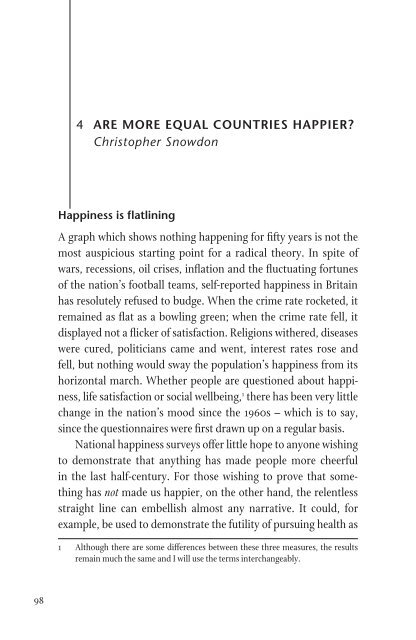… and the Pursuit of Happiness - Institute of Economic Affairs
… and the Pursuit of Happiness - Institute of Economic Affairs
… and the Pursuit of Happiness - Institute of Economic Affairs
You also want an ePaper? Increase the reach of your titles
YUMPU automatically turns print PDFs into web optimized ePapers that Google loves.
are more equal countries happier?<br />
4 Are more equal countries happier?<br />
Christopher Snowdon<br />
<strong>Happiness</strong> is flatlining<br />
A graph which shows nothing happening for fifty years is not <strong>the</strong><br />
most auspicious starting point for a radical <strong>the</strong>ory. In spite <strong>of</strong><br />
wars, recessions, oil crises, inflation <strong>and</strong> <strong>the</strong> fluctuating fortunes<br />
<strong>of</strong> <strong>the</strong> nation’s football teams, self-reported happiness in Britain<br />
has resolutely refused to budge. When <strong>the</strong> crime rate rocketed, it<br />
remained as flat as a bowling green; when <strong>the</strong> crime rate fell, it<br />
displayed not a flicker <strong>of</strong> satisfaction. Religions wi<strong>the</strong>red, diseases<br />
were cured, politicians came <strong>and</strong> went, interest rates rose <strong>and</strong><br />
fell, but nothing would sway <strong>the</strong> population’s happiness from its<br />
horizontal march. Whe<strong>the</strong>r people are questioned about happiness,<br />
life satisfaction or social wellbeing, 1 <strong>the</strong>re has been very little<br />
change in <strong>the</strong> nation’s mood since <strong>the</strong> 1960s – which is to say,<br />
since <strong>the</strong> questionnaires were first drawn up on a regular basis.<br />
National happiness surveys <strong>of</strong>fer little hope to anyone wishing<br />
to demonstrate that anything has made people more cheerful<br />
in <strong>the</strong> last half-century. For those wishing to prove that something<br />
has not made us happier, on <strong>the</strong> o<strong>the</strong>r h<strong>and</strong>, <strong>the</strong> relentless<br />
straight line can embellish almost any narrative. It could, for<br />
example, be used to demonstrate <strong>the</strong> futility <strong>of</strong> pursuing health as<br />
a political objective given that <strong>the</strong> ten-year increase in life expectancy<br />
enjoyed by <strong>the</strong> average Briton since 1965 has apparently not<br />
led to greater happiness. Equally, it could be argued that nei<strong>the</strong>r<br />
women’s liberation nor <strong>the</strong> expansion <strong>of</strong> <strong>the</strong> welfare state has<br />
improved <strong>the</strong> human lot.<br />
Such arguments are almost never put forward. Instead, it is<br />
always <strong>the</strong> assertion that economic growth has failed to boost<br />
wellbeing which has dominated debate. This debate began when<br />
Richard Easterlin first noticed <strong>the</strong> paradox <strong>of</strong> rising GDP <strong>and</strong><br />
flatlining happiness in <strong>the</strong> USA in 1974. The Easterlin paradox has<br />
since been challenged by researchers who say that happiness has<br />
been rising after all (Veenhoven <strong>and</strong> Hagerty, 2003; Stevenson<br />
<strong>and</strong> Wolfers, 2008; Deaton, 2008). That controversy is not <strong>the</strong><br />
subject <strong>of</strong> this chapter. We shall content ourselves with <strong>the</strong> simple<br />
fact that <strong>the</strong> large rise in GDP in <strong>the</strong> last 50 years has not been<br />
matched by a proportionate rise in subjective wellbeing.<br />
For critics <strong>of</strong> <strong>the</strong> free market, this is a vindication <strong>of</strong> <strong>the</strong>ir belief<br />
that capitalism has come to <strong>the</strong> end <strong>of</strong> its road. Although Easterlin<br />
never claimed that people would be happier in a ‘steady-state’ (i.e.<br />
zero-growth) economy than in a flourishing free market, o<strong>the</strong>rs<br />
have made this claim for him. These ‘growth sceptics’ (Ben-Ami,<br />
2010) might grudgingly admit that two centuries <strong>of</strong> increasing<br />
prosperity have improved living st<strong>and</strong>ards to an unprecedented<br />
degree. They might even be coaxed into conceding that life has<br />
been better in <strong>the</strong> capitalist West than in <strong>the</strong> workers’ paradises<br />
<strong>of</strong> <strong>the</strong> USSR. But, <strong>the</strong>y insist, flatlining happiness shows that <strong>the</strong><br />
benefits <strong>of</strong> growth have finally been wrung dry <strong>and</strong> that a different<br />
economic system is required if <strong>the</strong> people are to reach euphoria.<br />
1 Although <strong>the</strong>re are some differences between <strong>the</strong>se three measures, <strong>the</strong> results<br />
remain much <strong>the</strong> same <strong>and</strong> I will use <strong>the</strong> terms interchangeably.<br />
98<br />
99












